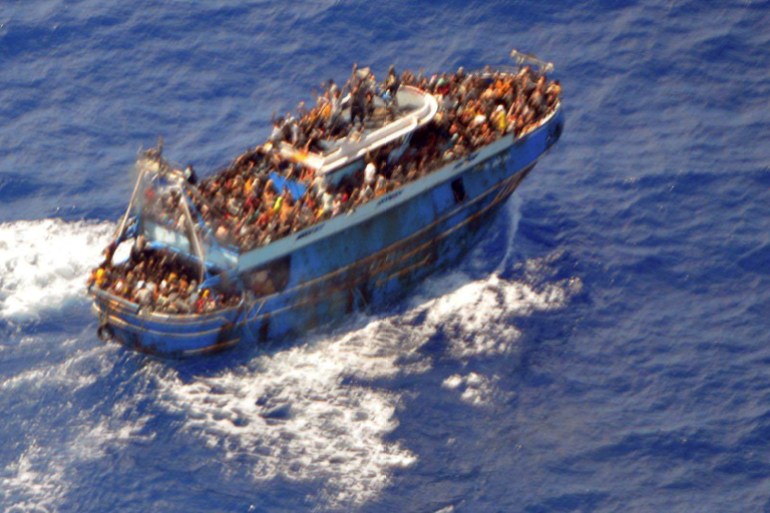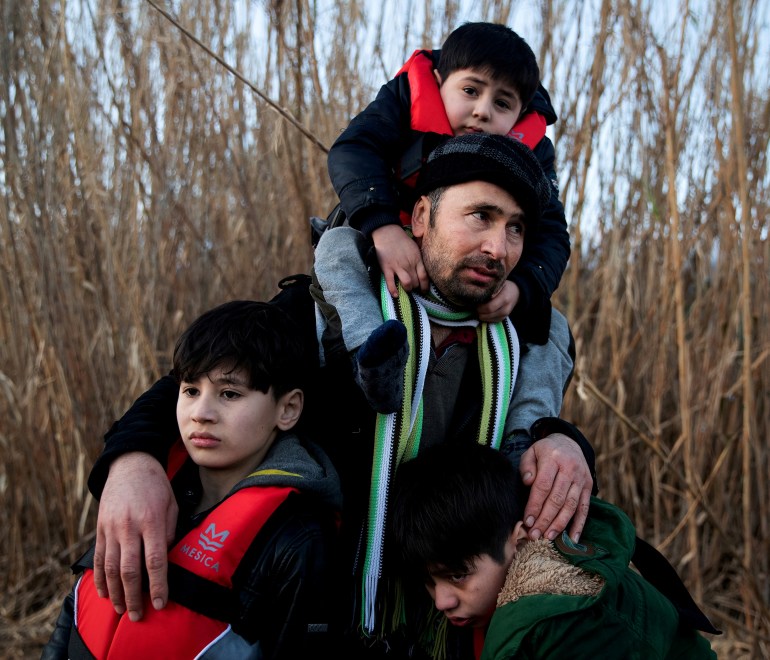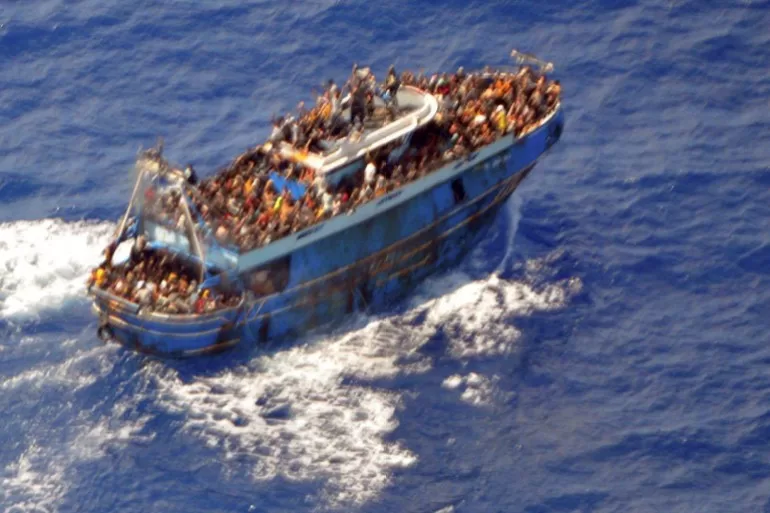At the time, the veracity of the video was questioned and Theodosis Nikitaras, the mayor of Kos, filed a defamation case against the NGO that published it.
Now, new documents obtained from the European Border and Coast Guard Agency (Frontex) confirm the incident and pin the responsibility on individuals it describes as “likely working in concert” with Greek authorities.
The 44-second video was published by the Aegean Boat Report NGO on June 26, 2023, the same day the incident took place. Since then, it has been seen by more than 660,000 people on X.
The NGO, which regularly reports allegations of human rights abuses at Greece’s sea borders with Turkey, said it had received the video from the people inside the van.
They included a child and many of them were Palestinians having arrived as asylum seekers from Turkey to Kos.
One woman had managed to conceal a phone in her bra and contacted the NGO via WhatsApp pleading for help. In a video she sent, the people are told to “shut up” in Greek by two unidentified men in the van after asking for the toilet.
There were 13 people in the van in total, according to Frontex.
In a so-called Serious Incident Report handled by the Fundamental Rights Office of Frontex, which deals with alleged rights abuses in Frontex activities, the office states that masked men claiming to be police officers approached a group of people, promising to transport them to a camp.
But the people were body searched and put in the back of a van. Everyone – except the woman and the child – were cable-tied and blindfolded. Several men in the video can be seen with brown masking tape stuck over their eyes.
The report details how the woman was slapped by the masked men after recording the scene. They destroyed her mobile phone when they saw her video being shared at pace online. Those detained were unable to use the toilet for the duration of their captivity and spent 16 hours in the van before being released by the masked men and apprehended by Greek police accompanied by a Frontex patrol.
The report concluded that the video seen on social media channels depicted the same people Frontex had found and said an agency officer saw visible markings on their wrists, suggesting they had been cable-tied.
“No incident with third-country nationals was recorded [on that date] in the wider sea region of Kos,” the Hellenic Coast Guard said in a statement to Al Jazeera.
It did not comment on the alleged abuse that unfolded.
The office of Kos Mayor Nikitaras told Al Jazeera that the case against Aegean Boat Report is now in the preliminary investigation stage.
“We firmly believe that the mayor of Kos is fully aware of what is going on in his island, and that he deliberately tried to cover this up by attacking the organisation which published the video,” Aegean Boat Report said on its website in late May.
According to people familiar with the case, those detained have since received asylum status. Some have left the country.
A person with direct knowledge of the proceedings told Al Jazeera, “It was a traumatic experience they want to leave behind.”
Pavlos Eleftheriadis, professor of legal studies at New York University Abu Dhabi, described the incident as a “a criminal matter”.
“These are criminal acts, this is abduction,” he told Al Jazeera. “I’m shocked that they are not regularly investigated by prosecutors on these islands.
“Why don’t the ordinary courts investigate these crimes? The most alarming thought is that these are not thugs from the street, but members of the police and the Coast Guard who remove their uniforms, and cover up their identities.”
“I find these allegations deeply troubling because these are very serious criminal offences and if true, there is a second criminal offence, which is the large-scale cover-up.”
Tommy Olsen, the founder of Aegean Boat Report, which is based in Norway, has long been in the crosshairs of Greek authorities.
Raising the stakes, the prosecutor’s office last month issued a national arrest warrant, which is in the process of being turned into an international one, based on a 2021 police investigation alleging that Olsen was part of a “criminal organisation” that facilitated the entry of refugees and migrants into Greece.
Norway has a “surrender procedure” agreement with the EU, which means Olsen, who denies all allegations, faces extradition.
The United Nations special rapporteur for human rights defenders called the news “disturbing” and said Olsen was the target in “what appears to be an arbitrary investigation criminalising his work in defence of the rights of migrants”.

The Kos incident is the latest in a series of allegations against Greek authorities and the controversial role of Frontex, the European Union’s best-funded agency, with a 2023 budget of more than 800 million euros ($870m).
The Warsaw-based body had been rattled for years by media investigations and accusations by NGOs of complicity in human rights abuses at the EU’s external borders – namely forcing would-be refugees away from a border before they could claim asylum.
The practice, known as pushbacks, is considered a violation of international and EU law.
Greece denies the pushbacks, insisting it is enforcing a “tough but fair” border policy, instead blaming exploitative criminal networks for the tragedies that befall refugees.
An inquiry by the EU’s antifraud agency OLAF sealed the fate of Frontex’s former head, the Frenchman Fabrice Leggeri, who resigned in April 2022 after seven years at the helm.
Leggeri, now a member of Marine Le Pen’s far-right Rassemblement National party which triumphed in recent European Parliament elections, was found to have known about such violations and colluded to hide them.
Leggeri denied the claims against him, and reportedly said EU nations were attempting to transform the border agency into an NGO.
These revelations stirred demands for Frontex to end its operations in Greece, an option available to the agency in the case of systematic fundamental rights abuses but considered the nuclear option and rejected by the agency’s previous and current administration.
Leggeri’s Dutch successor, Hans Leijtens, took office in March 2023, pledging more transparency and an end to pushbacks with Frontex’s involvement.
However, a trove of documents obtained via Freedom of Information Requests shows that in the Aegean and other EU external borders, human rights continue to be systematically violated. The documents include 19 Serious Incident Reports investigated by Frontex’s Fundamental Rights Office.
The agency’s conclusions present an array of human rights violations of asylum seekers, ranging from people being “ill-treated, subjected to theft of property and ultimately pushed back” to Turkey, to plausible allegations of being “brought from Greek to Turkish territorial waters and abandoned at sea by the Hellenic Coast Guard”.
A common theme is the involvement of “masked men” without insignia and the Greek authorities’ “general reluctance” to follow up on allegations and conduct thorough and independent investigations.
In its response to Al Jazeera, the Hellenic Coast Guard rejected Frontex’s conclusions, noting that pushbacks “are not part of [the agency’s] operational practices”.
One of the Serious Incident Reports corroborates details reported in a New York Times story published in May 2023, which documented the forced removal of people who had reached the Greek island of Lesbos and their subsequent abandonment at sea in engineless life rafts.
Frontex “established beyond doubt” that the people involved were “subjected to ill-treatment and pushed back”, the Serious Incident Report states, although Greek officials have yet to produce any conclusions despite their pledges to investigate the incident.
An independent inquiry is currently under way by “all competent national authorities”, the Hellenic Coast Guard told Al Jazeera in connection with this incident.

Assets deployed as part of Frontex’s assistance to Greece are also implicated.
In one instance, a Frontex vessel that intercepted a boat carrying migrants and refugees was told to leave the scene after the Hellenic Coast Guard took over the incident.
Even though the agency in this case found no fundamental rights were violated, it noted that the Frontex crew failed to report the incident following “instruction by the Greek officials”, a demand that also “did not comply with applicable rules”.
Incorrect reporting by Greek authorities omitted the “location of the detection inside Greek waters and Frontex involvement”, the file said.
These reports could also be just the tip of the iceberg.
Insiders working for both Frontex and Greek law enforcement agencies told Al Jazeera on condition of anonymity that the known cases represent only a fraction of what’s taking place, as they cited frequent underreporting or inaccurate reporting.
For its part, the Hellenic Coast Guard said effective border control should not be equated with pushbacks, condemning “a narrative that feeds the criminal networks exploiting migrants in the worst possible way” thereby “putting their lives at risk”.
A Frontex spokesperson told Al Jazeera that its Fundamental Rights Office has given “several recommendations to the Greek authorities after reviewing these concerning incidents”.
“We’re dedicated to ensuring all our operations in Greece are carried out in full compliance with the law and respect the dignity of all people. The option of withdrawing our support is a last-resort measure we don’t take lightly. Such a step would impact not just our joint efforts to secure the EU’s borders but also our ability to save lives.”
